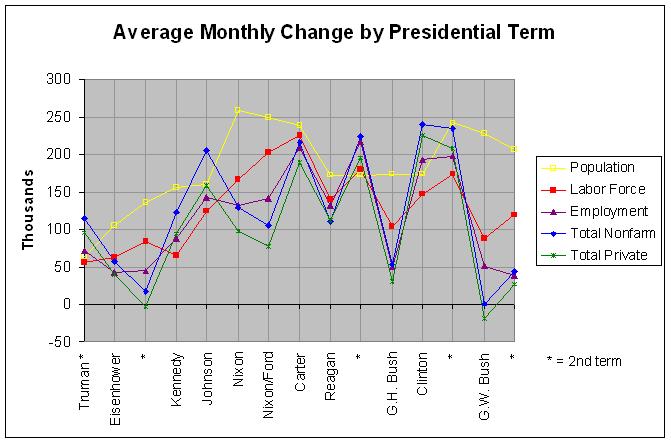Job Growth Under Bush and Prior Presidents (through August 2008)

As before, the data covers the 15 presidential terms since 1949. In almost every term of a Democratic president, the growth in household survey, nonfarm, and private employment was greater than the growth in the labor force. Conversely, in almost every term of a Republican president, the growth in household survey, nonfarm, and private employment was less than the growth in the labor force. The only two exceptions in the 15 terms were Carter and Reagan's second term.
A related fact is that the unemployment rate went down during almost every term of a Democratic president and up during almost every term of a Republican president since 1949. This follows from the prior fact because the unemployment rate equals the unemployed (labor force minus the employed) divided by the labor force from the Household Survey. In any case, the only exceptions to this second fact was Carter (when the unemployment rate stayed about the same) and both terms of Reagan.
Similar results are cited in an article that appeared on September 5th in the Huffington Post. Following is an excerpt:
No Republican President -- not Eisenhower, not Nixon, not Reagan, not Bush -- has ever created more jobs, or created jobs at a faster rate, than his Democratic predecessor. It's not even close. The contrast has been especially stark over the past 16 years, when 23.1 million jobs were created under Clinton and less than 5 million were created under Bush. On average, job growth under Democrats is more than twice that under Republicans.
Of course, it is debatable exactly now much a president can effect the creation of jobs. Politicians certainly imply that they can. As the Huffington Post article points out, John McCain has stated, "As President, I will enact a Jobs for America economic plan that creates jobs." Barack Obama has likewise listed plans to promote job creation on his website. On the other hand, this New York Times article states that "Robert Barbera, chief economist at the brokerage firm of ITG/Hoenig, says that in his 30 years in the business, 'the notion that presidents create and lose jobs is the most grotesque mischaracterization of the economic backdrop' that he has witnessed". Still, even that article suggests the following in the second to the last paragraph:
If the next president wants to make the job numbers in 2012 look better, he could start thinking about all of these: education, comprehensive retraining along the model of the Army and the Job Corps and wage insurance-type incentives. Will this "create" jobs? The U.S. economy is a big liner; it isn't easily turned. But thinking in such terms will accomplish more than the never-ending tinkering with the tax code. And it is surely better than the alternatives that try to freeze the economy in place by restricting trade or supporting shrinking industries.
In any event, as long as politicians put forth programs to promote job creation and voters demand that they do so, it's worth looking at the correlation of various programs to the creation of jobs.
Note: This topic is continued in my next post.
Comments
Post a Comment